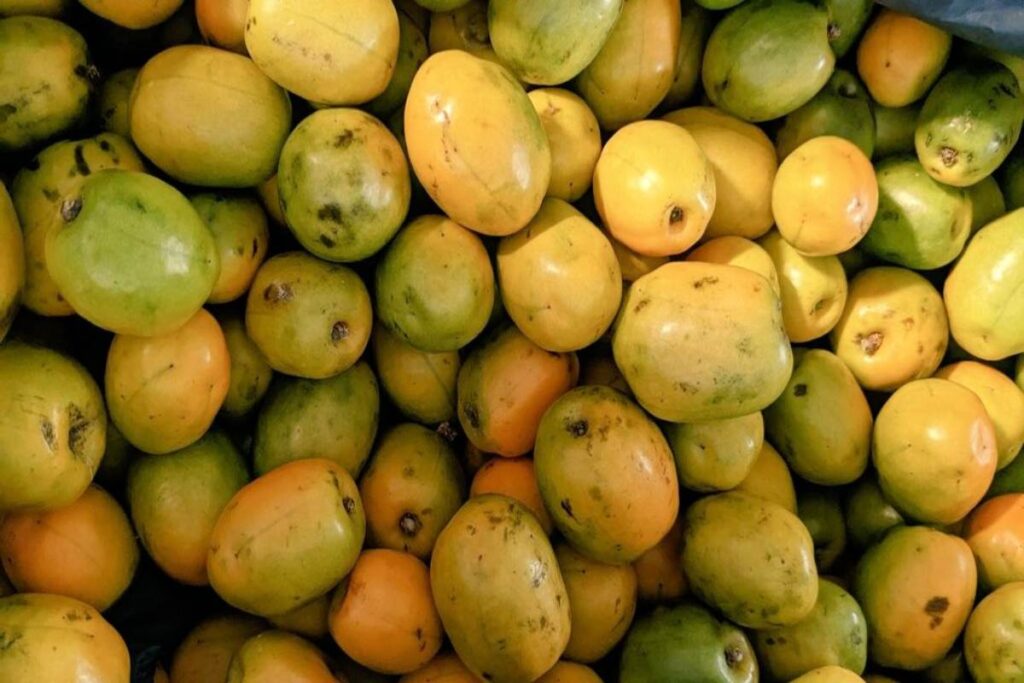Mangoes are loved all over the world for many reasons. One of these is their sweet taste which keeps you wanting more. Little wonder the fruit has found a lot of ways to end up in our meals and toppings. But can mangoes be too much? The answer is yes.
The saying that “too much of everything is bad” also holds for the stone fruit. The reason is that mangoes in more than moderate amounts can harm your health. Are you ready to see why? First, let’s get a bit more acquainted with the fruit.
What Are Mangoes?
You are likely unaware that the mango fruit is a member of the cashew family or the Anacardiaceae. Other members of this family include pistachio, hog plum, kaffir plum, wild plum, and of course, cashew.
Mango is an edible stone fruit from the Mangifera indica, which is largely regarded as indigenous to southern Asian countries, especially India and Myanmar. India produces more than half the world’s mangoes. Other major mango-producing countries include the Philippines, Mexico, China, Indonesia, and Thailand.

Mangoes are one of the world’s most popular fruits. For example, in 2023, the global mango market was worth $63 billion. Analysts expect this figure to balloon by 2028 to about $89 billion.
ALSO READ: Can Fruits and Vegetables Prescription Improve Health?
Can Mangoes Be Too Much?
Contrary to what many believe, you can have too many mangoes to eat. While the fruit offers loads of health benefits to the body, you will only get the best of its blessings if you take them in moderation.
First and foremost, mangoes contain lots of notorious calories, which is a unit of the energy people derive from what they eat. They contain more calories per fruit than other fruits. A mango can bring over 200 calories to the nutrition table. Of course, it’s common knowledge that too many calories can harm your health.
The sugar content of mango is also a cause for concern. One mango fruit contains about 46 grams of natural sugar. Too much mangoes can increase the risk of diabetes.
However, leading nutritionists have assured that “the sugar content is not of concern because mangoes are also packed with a variety of nutrients you don’t want to miss out on.” Moderation remains crucial. One or two mangoes per day will do.
What Are the Health Benefits of Mangoes?
Mangoes are a rich and popular source of Vitamins A, C, and D. Regardless of the species or size, every mango fruit hosts lots of nutritional goodness. Besides the vitamins, they contain proteins, potassium, and other minerals.
Proteins will reduce your appetite and hunger level. That’s because it helps you feel full. Proteins fight and subdue the hunger hormone called ghrelin. Consequently, this helps reduce food intake and calories, hence reducing belly fat. Other benefits of protein include increasing muscle mass and strength, boosting brain function, and promoting healthy aging.

Potassium helps maintain fluid balance. It regulates the amount of water inside and outside the cells, which is important for maintaining optimal health and warding off diseases such as the heart and kidneys. Potassium also promotes the smooth operation of the nervous system. Some studies say potassium may protect against stroke, high blood pressure, and kidney stones.
How Many Types of Mangoes Are There?
There are over 1000 types of mangoes today. You will find at least 500 of them in India. However, we can group these types into 13 varieties, each with its unique combination of size, texture, taste, appearance, and firmness.
They include the juicy and soft Kesar mangoes and the Kent, which are a bit sour and come out during the cold weather seasons. Then there is Tommy Atkins, which dominates the grocery stores in the US and the UK. Also, there are the giant Palmer mangoes, which weigh up to 2 pounds.
You might be fascinated by the Bombay Green, which is of Indian origin. This variety remains green at all times and doesn’t reveal its ripeness by its skin. Haden mangoes are prominent in Florida. They possess thick fibers all through and have crimson skin. The Chaunsa will be your favorite if you love more natural sugars.
ALSO READ: Get a Flat Tummy With These Simple Hacks To Burn Belly Fat
What Are the Sexual Benefits of Mango?
If you want to boost your sexual health, mangoes can deliver. There are several other benefits of mangoes sexually. Mangoes have aphrodisiac properties and hence are called the “love fruit.” Its Vitamin E, potassium, and magnesium content improve blood circulation and, as a result, enhance libido.

Mangoes also contain nutrients that improve sexual performance, such as natural sugars. They also contain mangiferin, a natural compound that lowers fatigue and enhances stamina—two requirements for optimal sexual performance.
Is Mango Good for Losing Weight?
Mangoes contain fiber. One of the major benefits of fiber in mangoes is that it controls blood sugar levels and lowers cholesterol. If you’ve been wondering, “What good are mangoes for weight loss?” There is great news. The fiber content in mangoes promotes a healthy weight, plus general well-being and longevity.
How? Fiber, even more than protein, makes us feel full and for longer. This helps us avoid overeating and accumulating fat from those extra calories. An average human requires about 30 to 38 grams of fiber every day. One mango fruit will supply 5 grams of that need.
You Might Also Like:
Lupita Nyong’o Speaks on Embracing Her Kenyan Accent After Hiding It as a Budding Actress
How Lucas Bravo Dealt With Initially Getting Rejected for Netflix Show “Emily in Paris”
Serena Williams’ Eldest Daughter Is a Hardcore Swiftie, Just Like Her Mother
Sean ‘Diddy’ Combs To Remain in Detention As Judge Refuses Bail Appeal
